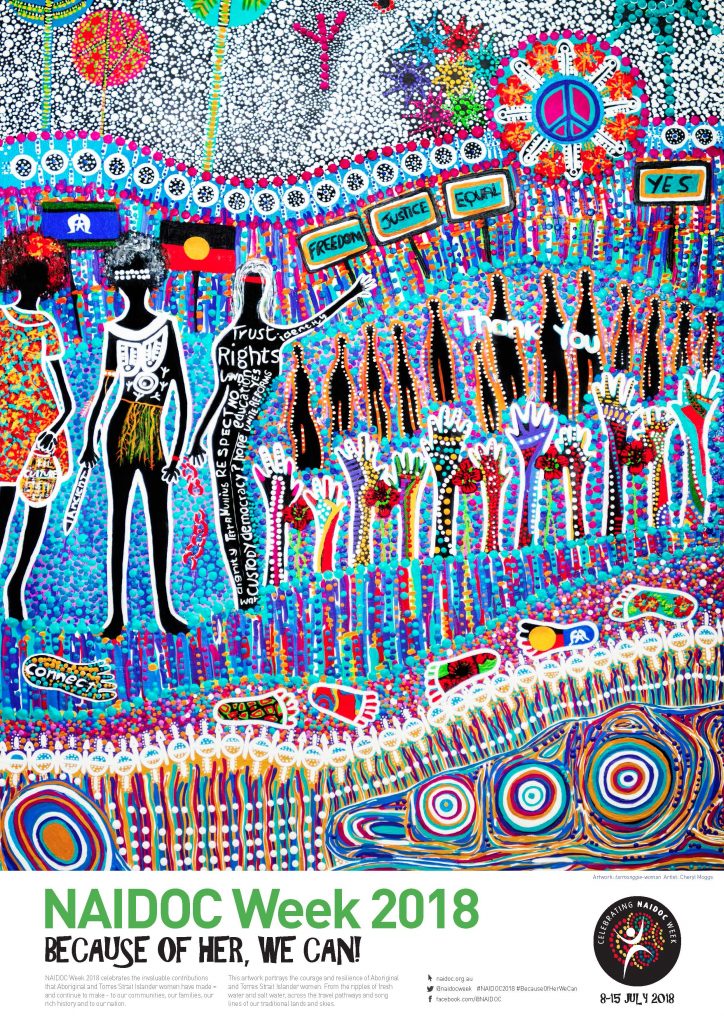
Artwork by Cheryl Moggs.
This article was written by our guest blogger Sarah Burr!
Sarah is an Aboriginal feminist with roles in Indigenous Affairs, YWCA Canberra, and the ABC. She believes girls and women will change our world for the better.
This year’s NAIDOC Week theme is all about celebrating the contribution of Aboriginal and Torres Strait Islander women throughout pre- and post-colonial Australian history. It is also about acknowledging how these women have paved the way for young Aboriginal and Torres Strait Islander girls and women today. It is a time to celebrate the achievements of the First Nations women in our past and present, a time to recognise the labour of our sisters in eldership, and – in my opinion – a time to discuss Aboriginal feminism and why we need it now more than ever.
At every NAIDOC Week celebration in any given year there will be Aunties and Nanas and other Aboriginal and Torres Strait Islander women delivering welcomes to country, performing smoking ceremonies, preparing morning- and afternoon-teas, and sharing matrilineal cultural knowledge (no didgeridoos here!) for predominantly non-Indigenous audiences. Some of these women will be paid for their time, labour and cultural intellect; most will not.
During this year’s feminocentric NAIDOC events, there will be panels of First Nations and non-Indigenous women asked to share their perspectives on intersectionality in feminism in Australia. Some panels will consider what mainstream feminism needs to do to be more considerate of First Nations women’s perspectives; many will ask what First Nations women can do to better educate non-Indigenous women about the need to be more culturally aware, more inclusive.
Throughout this year, initiatives will be announced to encourage, to support and to elevate the efforts of Aboriginal and Torres Strait Islander women in their respective fields. Some of these measures will celebrate First Nations women’s individual and collective successes; others will reinforce the “backbone of the community” stereotype which relegates the First Nations woman to a support act in her own story.
As a group, Aboriginal and Torres Strait Islander women in Australia are (and were) undervalued and underrated by the dominant communities and cultures in this country. This year’s NAIDOC theme affords us the chance to reconsider how First Nations women are positioned in Australian society, reassess how our time, labour and intellect is valued, and reflect on whether self-determination is a genuine option for all Aboriginal and Torres Strait Islander girls and women in 2018. These are a few of the reasons why Aboriginal feminism is so important today, in order to shape a more equitable, fair and just tomorrow.
Aboriginal feminism seeks the same outcomes as mainstream feminism, including (but not limited to!) girls and women being equal, valued, safe and respected, equally remunerated for equal work, having a voice and being heard, and having the right to individual choice. Both mainstream feminism and Aboriginal feminism pursue equality for all by dismantling oppressive structures, yet First Nations women are still an “other” in our own country; there are additional (colonised, race-based, cultural, economic) barriers to overcome. These are the structures that First Nations women cannot dismantle on our own, and this is partly why Aboriginal feminism differs to mainstream feminism.
In the same way that non-Indigenous women can identify in myriad ways and exist in binaries, paradigms and intersectional representations, so can First Nations women. However, distinct cultural beliefs, patriarchal communities, communal societies, eldership relationships, varying degrees of assimilation, and just general personal differences make for a highly complex and non-homogenous group of women who all happen to identify as Aboriginal and Torres Strait Islander. These are the complexities that separate Aboriginal feminism from mainstream feminism.
First Nations women are multi-dimensional beings with sophisticated perspectives and valuable opinions to share. But historical policies (such as the forced migration of people off traditional country, stolen wages and indentured labour, the stolen generations, and a lack of recognition of traditional ownership of land) have minimised First Nations women’s agency, autonomy and ability to share such wisdom by entrenching an intergenerational dividend of inequality. For reasons of self-determination, First Nations women need Aboriginal feminism now more than ever.
Australia will truly achieve equality when First Nations women are equal. A week of celebrating Aboriginal and Torres Strait Islander women is overdue, but the collective lessons learned about inclusiveness and a shared Australian sisterhood are invaluable. Recognise Her, Value Her, Empower Her. Because of Her, We Can!
NAIDOC Week is held from 8 to 15 July 2018. Learn more about NAIDOC Week here, and see how you can get involved here.

